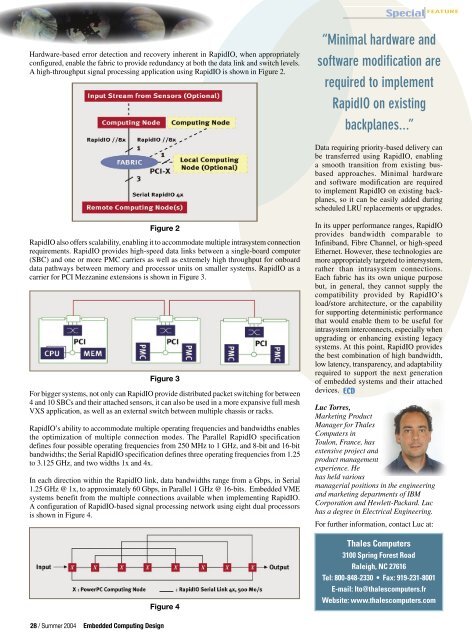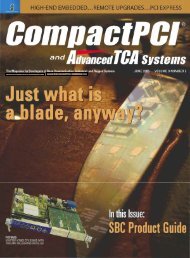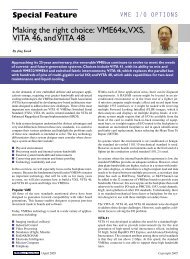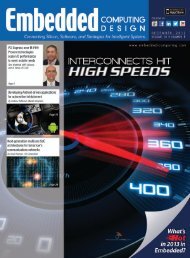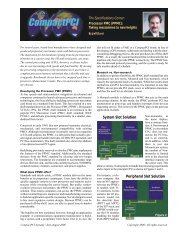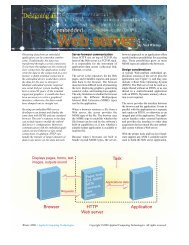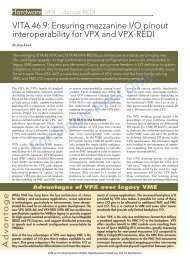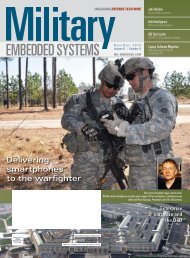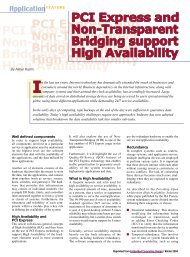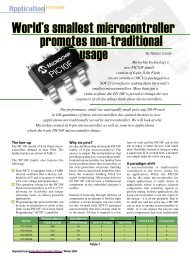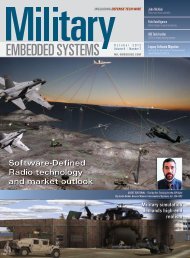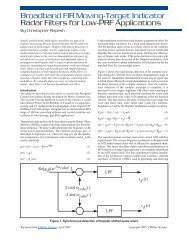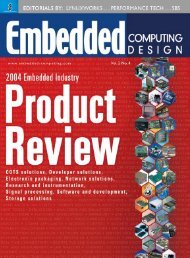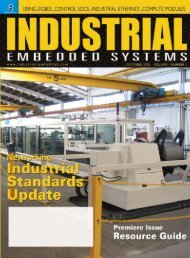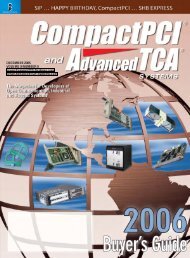Embedded Computing Design - OpenSystems Media
Embedded Computing Design - OpenSystems Media
Embedded Computing Design - OpenSystems Media
You also want an ePaper? Increase the reach of your titles
YUMPU automatically turns print PDFs into web optimized ePapers that Google loves.
Hardware-based error detection and recovery inherent in RapidIO, when appropriately<br />
configured, enable the fabric to provide redundancy at both the data link and switch levels.<br />
A high-throughput signal processing application using RapidIO is shown in Figure 2.<br />
“Minimal hardware and<br />
software modification are<br />
required to implement<br />
RapidIO on existing<br />
backplanes...”<br />
Data requiring priority-based delivery can<br />
be transferred using RapidIO, enabling<br />
a smooth transition from existing busbased<br />
approaches. Minimal hardware<br />
and software modification are required<br />
to implement RapidIO on existing backplanes,<br />
so it can be easily added during<br />
scheduled LRU replacements or upgrades.<br />
Figure 2<br />
RapidIO also offers scalability, enabling it to accommodate multiple intrasystem connection<br />
requirements. RapidIO provides high-speed data links between a single-board computer<br />
(SBC) and one or more PMC carriers as well as extremely high throughput for onboard<br />
data pathways between memory and processor units on smaller systems. RapidIO as a<br />
carrier for PCI Mezzanine extensions is shown in Figure 3.<br />
Figure 3<br />
For bigger systems, not only can RapidIO provide distributed packet switching for between<br />
4 and 10 SBCs and their attached sensors, it can also be used in a more expansive full mesh<br />
VXS application, as well as an external switch between multiple chassis or racks.<br />
RapidIO’s ability to accommodate multiple operating frequencies and bandwidths enables<br />
the optimization of multiple connection modes. The Parallel RapidIO specification<br />
defines four possible operating frequencies from 250 MHz to 1 GHz, and 8-bit and 16-bit<br />
bandwidths; the Serial RapidIO specification defines three operating frequencies from 1.25<br />
to 3.125 GHz, and two widths 1x and 4x.<br />
In each direction within the RapidIO link, data bandwidths range from a Gbps, in Serial<br />
1.25 GHz @ 1x, to approximately 60 Gbps, in Parallel 1 GHz @ 16-bits. <strong>Embedded</strong> VME<br />
systems benefit from the multiple connections available when implementing RapidIO.<br />
A configuration of RapidIO-based signal processing network using eight dual processors<br />
is shown in Figure 4.<br />
Figure 4<br />
In its upper performance ranges, RapidIO<br />
provides bandwidth comparable to<br />
Infiniband, Fibre Channel, or high-speed<br />
Ethernet. However, these technologies are<br />
more appropriately targeted to intersystem,<br />
rather than intrasystem connections.<br />
Each fabric has its own unique purpose<br />
but, in general, they cannot supply the<br />
compatibility provided by RapidIO’s<br />
load/store architecture, or the capability<br />
for supporting deterministic performance<br />
that would enable them to be useful for<br />
intrasystem interconnects, especially when<br />
upgrading or enhancing existing legacy<br />
systems. At this point, RapidIO provides<br />
the best combination of high bandwidth,<br />
low latency, transparency, and adaptability<br />
required to support the next generation<br />
of embedded systems and their attached<br />
devices.<br />
Luc Torres,<br />
Marketing Product<br />
Manager for Thales<br />
Computers in<br />
Toulon, France, has<br />
extensive project and<br />
product management<br />
experience. He<br />
has held various<br />
managerial positions in the engineering<br />
and marketing departments of IBM<br />
Corporation and Hewlett-Packard. Luc<br />
has a degree in Electrical Engineering.<br />
For further information, contact Luc at:<br />
Thales Computers<br />
3100 Spring Forest Road<br />
Raleigh, NC 27616<br />
Tel: 800-848-2330 • Fax: 919-231-8001<br />
E-mail: lto@thalescomputers.fr<br />
Website: www.thalescomputers.com<br />
28 / Summer 2004 <strong>Embedded</strong> <strong>Computing</strong> <strong>Design</strong>


